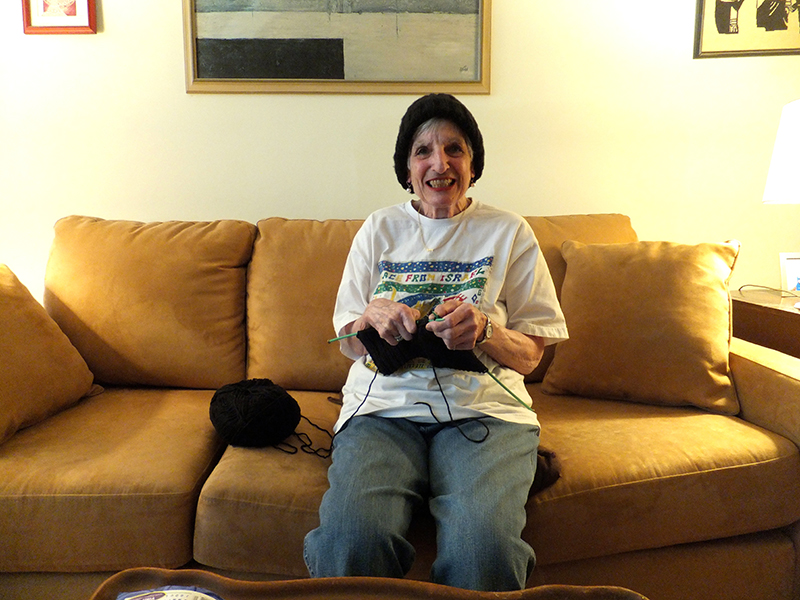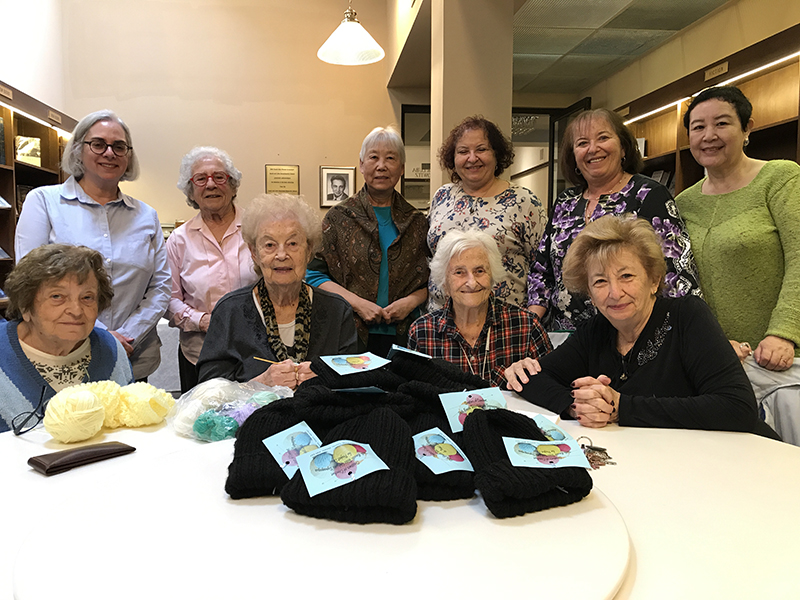With its icy cold winters, Toronto seems like a natural hub for knitters who are dedicated to creating hand-made items for family and friends, as well as for charitable causes, such as IDF soldiers in Israel.
Hats for Israeli Soldiers is a grassroots initiative founded in Israel in 2008 by Channah Koppel, the mother of an IDF soldier. The project struck a chord with knitters around the world. Since its inception, more than 50,000 hats have been made for combat soldiers on Israel’s front lines.
“It started from nothing,” Koppel explained to The CJN. “My son was serving a winter term in Hermon, in northwest Israel, 10 years ago. People said, ‘let’s do something for the soldiers,’ so we made a few hats for his unit of 10 soldiers to keep them warm. Others chimed in they would like some, too. The hats provide both physical and emotional support, and it feels good knowing that a soldier doing guard duty in the cold will be wearing a warm, hand-knitted hat, made with love. I put out notices on chat groups through social media and people started sharing to synagogues abroad. It just mushroomed.”
Eighty-year-old Ruth Belick has been knitting all her life and has been making black woollen tuques for Israeli soldiers for almost eight years now.
READ: THE KNITTING LADY – KEEPING ISRAELI CHILDREN WARM FOR DECADES
“I mailed my first six hats to Israel on Jan. 31, 2011,” said Belick with pride. “I can do three a week. It’s a fulfilling way of passing time.”
To date, Belick has sent 580 lovingly hand-knitted tuques to Israel. “I buy my own wool at Michaels,” said Belick. “I buy at least seven huge 14 oz balls of wool that lasts me six months.”
The hats are basic black ski caps in one stretchable size. Each must be knit to rigorous specifications set by the IDF, including a certain pattern to meet strict uniform regulations. The patterns are simple enough for the novice knitter and can be a quick project for the more experienced. Once the tuques arrive in Israel, Koppel sews a Hebrew label inside, indicating that they were knit with love and warmth.
The Beth Emeth Bais Yehuda Synagogue Chesed Knitters started knitting tuques for IDF soldiers eight years ago.

“We produce around 25 hats each month,” said Eleanor Minuk, a synagogue board member. “These people are knitting machines.”
One doesn’t have to be a synagogue member to be part of the club. “The average age of our knitters is mid-80s, but there are a few in their 60s and even in their 90s. We have a Chinese woman, a Muslim lady and a man that knits with us. It’s really grown in the sense that we have different cultures and backgrounds. Yarn is either donated or purchased through donations. It’s rewarding work,” said Minuk.
Participants have joined the project from around the world. Most are Jewish, but not all. “Somebody in New Zealand or Hong Kong or Vancouver can knit a hat with their own hands and it goes on someone’s head, keeping them warm in the winter,” said Koppel. “The soldiers really appreciate it. They see the personal aspect of it and I get a lot of letters saying it’s so nice that people think of us.”
Dovid Berger, an IDF soldier, was wearing a hat from the Chesed Knitters and sent this letter to Koppel last Purim: “I’m currently a chayal in the 51st brigade of Golani. We are now on our way to a week-long drill in the cold and wet Golan Heights, and last night we received our beautiful black hats you sent us. Thank you so much, some of us have been borrowing each other’s hats and now there’s enough for everyone to have at least one. It really makes a big difference to us to see how people from Canada and the U.S.A. (and everywhere in the world) are really caring about us. May it be God’s will that, because of all these beautiful acts of love between the Jews of the Diaspora and the ones living here, we should all be protected from our enemies and continue to build our country.”
The tuques can be mailed or personally delivered to Israel.
Koppel has a deep appreciation for all her knitters and hopes “they keep them coming and have the strength to keep on knitting for many years to come, because they are doing a great thing, a mitzvah.”
